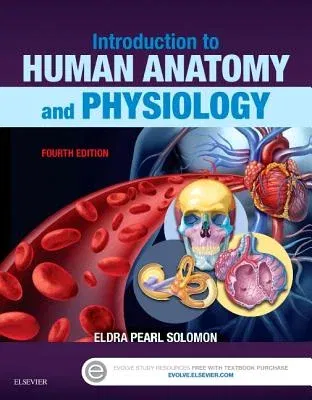Eldra Pearl Solomon
(Author)Introduction to Human Anatomy and PhysiologyPaperback, 15 October 2015


Description
Students learn best when they can relate what they are studying to familiar issues, problems, and experiences, and Introduction to Human Anatomy and Physiology, 4th Edition does just that. With a clear and concise focus on anatomy and physiology, this new edition explains the normal structure of the human body and how it functions to maintain a state of balance and health - and covers need-to-know principles in an easy-to-understand manner. It focuses on how tissues, organs, and body systems work together to carry out activities such as maintaining body temperature, regulating blood pressure, learning, and responding to stress. Completely updated with a brand new art program, this engaging, user-friendly text clarifies concepts that are often difficult for various career-level health professions students to grasp through reading only.
- UNIQUE! Tools for Learning pedagogical approach ties together learning objectives, Quiz Yourself boxes, and chapter summaries to help summarize key material, identify important topics, and seamlessly test your comprehension as you work through the text.
- UNIQUE! Concept-statement headings and subheadings, clearly visible throughout the text, transform simple descriptions into key ideas that you should learn in each section of content.
- Need-to-know information includes only basic anatomy and physiology content to avoid causing confusion.
- Chapter outlines at the beginning of each chapter provide a brief synopsis of the chapter and act as a guide for you to prioritize topics.
- Learning objectives appear after main headings to help you concentrate on important information.
- Chapter summaries illustrate how the topics covered in each chapter support the learning objectives.
- Quiz Yourself boxes at the end of each major section reinforce information as it is learned, measure mastery of learning objectives, and test your knowledge and comprehension of key topics within the chapter.
- Glossary, including key terms, pronunciations, definitions, and chapter references, emphasizes and defines essential terminology.
- Key terms, presented with pronunciations in bold throughout the text, show you what terminology is critical to gaining a solid understanding of anatomy and physiology.
- Illustrated tables, with illustrations integrated into the rows and columns, bring tables to life and combine the functionality of succinct tabular material with the added visual benefit of illustrated concepts.
- A conversational style facilitates learning and ensures you are not intimidated.
- End-of-chapter quizzes consist of fill-in-the-blank, multiple choice, and new vocabulary matching exercises that let you evaluate your understanding of chapter content. You can find the answers on Evolve.
- Review questions, including labeling exercises, at the end of each chapter focus on important concepts and applications and allow you to relate structure to function.
- Study Guide, for sale separately, mirrors the text's Table of Contents and includes study questions, labeling exercises, and crossword puzzles that provide you with a fun way to reinforce concepts learned in the text.
- Evolve site provides support and guidance for new instructors with minimal teaching experience - and facilitates student learning through a variety of interactive and supplemental resources.
NEW! Audio chapter summaries on Evolve can be downloaded to your MP3 player, providing you with an easy, portable way to reinforce chapter concepts.
NEW! Completely updated illustration program reinforces content and keeps the text fresh.
NEW! Thoroughly updated content ensures material is accurate, current, and reflective of the latest research and topics related to anatomy and physiology.
NEW! Key words with definitions and pronunciations, listed at the beginning of each chapter and in the Glossary, help reinforce your terminology comprehension.
NEW! Matching vocabulary exercises added to chapter quizzes to help you identify important words and definitions.
NEW! Answers to in-book questions on Evolve for instructors, instead of in the book, so instructors have the flexibility to provide or not provide answers to chapter quizzes and review questions from the book - and decide whether or not to use them for homework assignments.